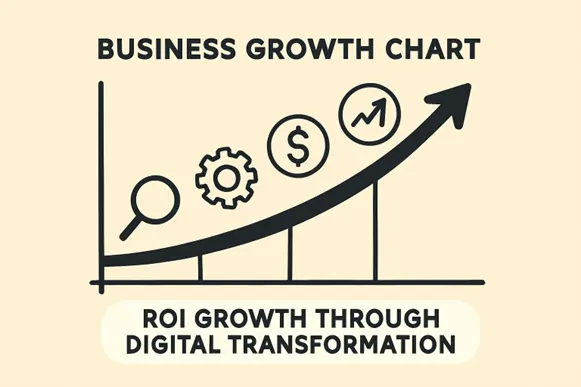In today’s fiercely competitive private equity landscape, sustainable growth and strong returns hinge on strategic innovation. One of the most effective and scalable levers for value creation is digital marketing. By transforming the way PE-backed companies attract, nurture, and retain customers, digital marketing enhances operational efficiency while maximizing both short- and long-term value. These benefits go far beyond superficial branding—they directly link to quantifiable revenue growth and improved company valuations, making digital approaches essential to value creation for portfolio companies.
As PE firms invest in digital capabilities, their portfolio companies experience improvements in marketing and business agility, unlocking value, increasing exit multiples, and outperforming rivals that rely on older sales tactics. Achieving this requires C-suite commitment, continuous analysis, and a willingness to adopt new tools. This can mean building new digital channels, gaining insights from data, and enhancing customer experiences to boost revenue and loyalty. Digital transformation is now essential for PE sponsors as a core strategy for value and resilience, with top firms prioritizing digital marketing to drive synergy across functions.
The Role of Digital Marketing in Private Equity
Digital marketing is a growth catalyst for both established and emerging PE-backed companies. Implementing comprehensive digital strategies can exponentially expand a company’s addressable market, deepen customer engagement, and streamline touchpoints throughout the sales funnel. Whether a company is looking to expand through e-commerce, target new verticals, or refine its value proposition, digital marketing provides the agility and scalability to support these ambitions.
Modern digital marketing integrates sophisticated audience targeting, automation, and data analytics—components that are rarely part of traditional sales playbooks. The result is better lead quality, shorter sales cycles, and an overall boost in enterprise value, which are critical for high-performing PE portfolios. Digital transformation is now a foundational aspect of success stories in PE-backed businesses.
Implementing Data-Driven Strategies
Leveraging data-driven techniques is essential for PE firms seeking to scale profitability across their holdings. Fundamental pillars include:
- Search Engine Optimization (SEO): Effective SEO enhances visibility and drives sustained organic traffic, delivering an impressive return on investment (ROI). Backed by industry findings, comprehensive SEO campaigns can return up to $22 for every dollar spent, making it vital for sustainable growth and digital discovery.
- Content Marketing: By sharing valuable thought leadership, product education, or case studies, companies increase brand authority, trust, and audience engagement—all keys to healthy pipeline development.
- Paid Advertising: Hyper-targeted, data-fueled advertising reaches highly specific segments, rapidly testing and scaling campaigns to maximize campaign efficiency and measurable ROI.
Leveraging Emerging Technologies
Incorporating modern technologies supercharges traditional digital playbooks, revealing new avenues for revenue and engagement:
- Artificial Intelligence (AI): Today’s AI-powered platforms analyze consumer behaviors, anticipate purchasing trends, and deliver tailored messaging at scale, increasing campaign relevance and success rates.
- Machine Learning: Machine learning models continuously refine digital media allocations, email workflows, and customer segmentation in real time—ensuring that performance keeps improving month after month.
When portfolio companies invest in AI and data science, they’re primed to outmaneuver competitors, respond quickly to market signals, and personalize user experiences—a win for the company, its customers, and PE investors alike.
Measuring and Optimizing ROI
Continuous measurement is the backbone of digital marketing’s success in private equity portfolios. Monitoring key performance indicators (KPIs)—such as customer acquisition cost (CAC), lifetime value (LTV), and overall conversion rates—empowers sponsors to adjust tactics, reallocate budgets, and celebrate measurable wins. Analytics platforms, such as Google Analytics or Tableau, enable real-time insights, ensuring that digital strategies evolve in response to shifting market conditions. Mastery of analytics separates the best PE operators from the pack.
Challenges and Considerations
Digital marketing offers advantages but faces challenges, including talent acquisition, system integration, and data privacy concerns. Talent demand outpaces supply, making recruitment competitive and costly. Careful planning and collaboration across business units are essential for the seamless adoption of digital tools, while strict regulatory compliance is crucial for maintaining trust and long-term viability.
Conclusion
Digital marketing is a non-negotiable driver of growth and sustainable ROI in modern private equity portfolios. By adopting a disciplined, data-driven approach and harnessing advanced technologies, PE firms and their portfolio companies unlock exponential value. Continuous optimization, rigorous measurement, and a commitment to innovation ensure that these strategies remain effective in an agile, competitive market environment.
Read more: Best Face Swap AI and Talking Photo Tools of 2025 – Croudmomentum.com
Best Sites to Buy Spotify Followers for Music Creators – Croudmomentum.com
Secret Hacks to Have Better Watch Time on YouTube – Croudmomentum.com








